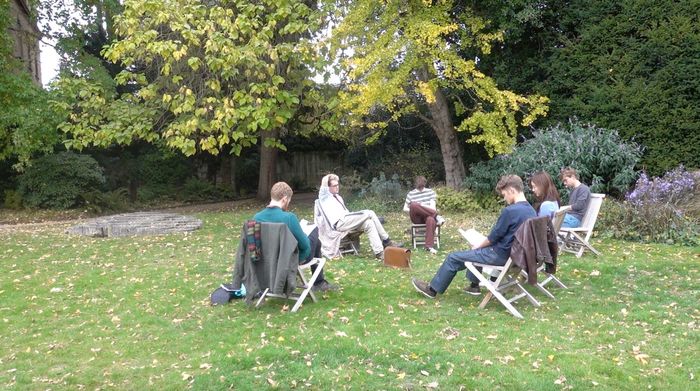In conversation with Bafta-winning screenwriter, Sarah Phelps
Daisy Simpson talks all things student theatre with the writer of The Sixth Commandment

According to lauded screenwriter Sarah Phelps, being intimidated by performatively self-assured fellow students at Cambridge, or, as she puts it: “knocked by other people’s confidence,” is pretty much a rite of passage, one that only pretenders claim not to be familiar with. “If someone says to you that they know what they’re doing,” she declares over Zoom, “you shouldn’t trust them”. Her impostor syndrome has not abated in the ensuing years, as she confides that she still sometimes feels as though she’s waiting for a hand to fall on her shoulder and a voice to say: “You’ve had your fun – now f**k off”. It is exactly this feeling of insecurity, however, that she believes aspiring actors, writers, and producers can instrumentalise on the student stage. The advantage of being out of your depth is that you’re surrounded by those experiencing the same phenomenon, and you therefore have access to a kind of creative freedom that you will never again encounter. Phelps firmly believes that you’re allowed – nay, encouraged – to mess up student theatre. She invokes Beckett, albeit with a personal spin, as she encourages us to “f**k up better” when we’ve done so once.
“‘If someone says to you that they know what they’re doing,’ she declares over Zoom, ‘you shouldn’t trust them’”
As a former participant in the Cambridge student theatre scene herself, as well as a decorated writer for the screen (her series The Sixth Commandment won a Bafta for Best Limited Drama in 2024), Phelps knows a thing or two about the process of bringing a character of life. One of the most significant things to bear in mind, she declares, is: “What [they’re] doing when [you] can’t see them”. The unseen, unrealised moments contribute to the authenticity as much as those witnessed by the audience. This approach encompasses even ostensible villains; Phelps wonders aloud: “How f**king terrifying it must be to be Bill Sikes,” not knowing whether someone might “stick a knife in [him]” at any given moment. And although she’s not a particularly strong proponent of Stanislavski’s method, she is fascinated by quotidian character neuroses: “What wakes them up in a cold sweat at four a.m.?” or “what life feels like on their skin”. When I ask her opinion on student actors too shy to venture into the world of backstage intricacies, she asserts that they shouldn’t let “their fear of failure stop them from trying”; rather, they should “hurl themselves at the thing they love”.
Phelps’ thoughts on the characterisation of period dramas, including that of the aforementioned Oliver Twist rogue, seem to fit the political climate of the moment with grim appropriateness. When I enquire as to whether or not she specifically selects British source material for her projects, she responds that her choices tend to have some sort of link to Britain due to the fact that our society is “endlessly monstrous and fascinating”. This is particularly true when it comes to a certain grotesque brand of nostalgia: the advent of Brexit, and all the empty ‘good old days’-style nationalism it fostered, remind Phelps of the brink-of-war tensions of 1939. All the country’s collective problems with identity, pride, and delusion, are, in her mind, reflective in and of themselves of what the classical playwrights attempted to capture in Greek tragedy.
“No amount of digital flashiness can make up for a lack of ‘talent’”
I press her to expand on this cross-generational style of intertextuality, and whether it has a place on the non-professional stage. “It’s all there for the taking,” she states emphatically, and this attitude clearly extends to Renaissance source material as well. She cites a description of Sons of Anarchy as essentially “Hamlet on motorbikes,” and the Jacobean tragedy Tis Pity She’s A Whore, reimagined as a Western directed by John Ford in the form of a short story by Angela Carter, as some of her favourite instances of this kind of intertextuality.
Phelps’ lucidly articulated creative ethos seems to centre around the art of listening, something that’s perhaps becoming increasingly undervalued in the age of media and audio-visual bombardment. When I ask her whether she thinks developments in the world of social media and online publicity will ultimately have a positive or negative effect on the popularisation of student productions, she makes it clear that no matter how tech-savvy you may be, word of mouth cannot be replaced. “The digital space is just as f**king noisy and deafening and crowded” as its physical equivalent; but in the end, her takeaway is that no amount of digital flashiness can make up for a lack of “talent” – her staunch belief in the unequivocal importance of theatrical authenticity is palpable.
 News / Right-wing billionaire Peter Thiel gives ‘antichrist’ lecture in Cambridge6 February 2026
News / Right-wing billionaire Peter Thiel gives ‘antichrist’ lecture in Cambridge6 February 2026 Features / From fresher to finalist: how have you evolved at Cambridge?10 February 2026
Features / From fresher to finalist: how have you evolved at Cambridge?10 February 2026 Film & TV / Remembering Rob Reiner 11 February 2026
Film & TV / Remembering Rob Reiner 11 February 2026 News / Churchill plans for new Archives Centre building10 February 2026
News / Churchill plans for new Archives Centre building10 February 2026 News / Epstein contacted Cambridge academics about research funding6 February 2026
News / Epstein contacted Cambridge academics about research funding6 February 2026










